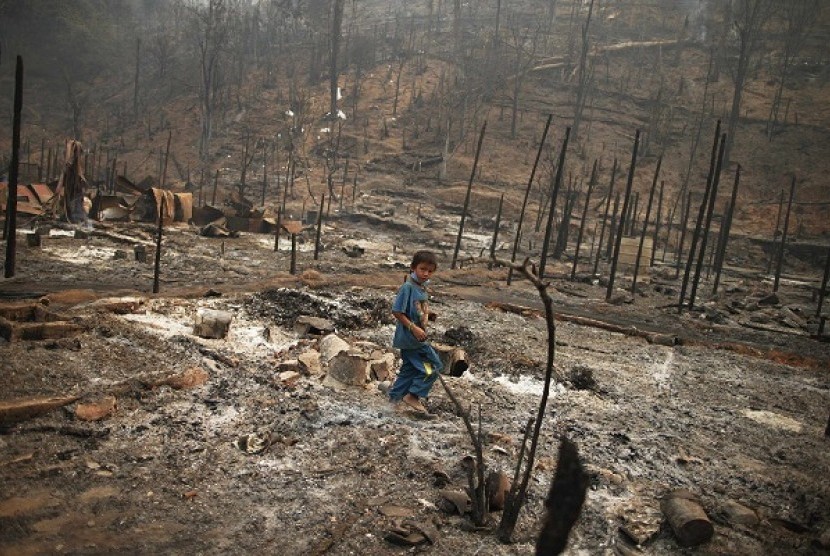REPUBLIKA.CO.ID, MEIKHTILA - Myanmar's government is struggling to contain anti-Muslim violence that touched the outskirts of the capital, Naypyitaw, at the weekend and forced it to send troops to patrol the streets in the town where the recent trouble started.
Four houses and a small mosque in Tatkon township on the northern edges of Naypyitaw were set ablaze late on Sunday, a civil servant in the capital told Reuters on Monday. Communal tension, stifled under half a century of army rule, has resurfaced since President Thein Sein's reformist government took office in 2011.
It has released dissidents and relaxed media censorship, but was also criticised for failing to quell last year's violence in Rakhine State in western Myanmar. Official figures say 110 people were killed and 120,000 were left homeless, most of them Rohingya Muslims.
The latest unrest began last Wednesday in Meikhtila, 130 km (80 miles) north of the capital and sparked by an argument between a Buddhist couple and the Muslim owners of a gold shop that escalated into rioting in which 32 people died, official figures show.
Police were criticised in the media and by local people for making little effort to halt the violence as ethnic Burmese Buddhists including monks stalked the streets armed with swords and knives.
More than 2,000 people are now living in makeshift camps, but calm has been restored by the military, sent in on Friday when the government declared martial law in the area.
"I think I am safe now and I can reopen my shop because of soldiers guarding the town," 52-year-old Khin Mya told Reuters. "Soon after soldiers arrived, we got peace. The situation had been very, very dangerous in previous days."
Vijay Nambiar, UN special adviser on Myanmar, told Reuters after visiting the area on Sunday that the government had said to him it would not hesitate to send troops in elsewhere if needed. In a statement, the United Nations warned the sectarian unrest could endanger the reforms initiated by Thein Sein.
"Religious leaders and other community leaders must also publicly call on their followers to abjure violence, respect the law and promote peace," Nambiar said in the statement.
State-run MRTV said on Sunday police had arrested 35 people in Meikhtila and two other townships in connection with the violence.
Not ousiders
In one incident late on Saturday, unknown assailants torched more than 40 homes, 38 belonging to Muslims, in Ywadan village in Yamaethin township, said Soe Lwin, a local official. The village is 66 km (41 miles) south of Meikhtila.
"At about 8 pm, around 100 people turned up shouting 'Let's burn it down, let's burn it down,' and started destroying our house first," said a 35-year-old shop owner in Ywadan, asking not to be named.
"It didn't look like they were outsiders. I think it's the people from this area," he said, speaking through the fence of a school where Muslims had taken refuge. "I could feel the way they looked at us had changed since Meikhtila happened."
Tension was high in certain parts of Yangon, the former capital and Myanmar's biggest city. Police were stationed outside mosques on Sunday evening. Myanmar is a predominately Buddhist country, but about 5 percent of its 60 million people are Muslims


